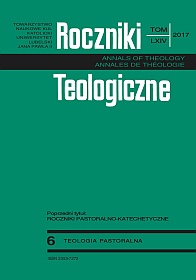Merciful Like the Father—the Vision of Pastoral Care in the Parish
Abstract
Sacred Scripture provides indications of how to channel pastoral care in the parish so that pastors and lay evangelizers will be merciful like the Father. The Merciful God is presented in the Parable of the Lost Sheep, the Parable of the Lost Drachma and the Parable of the Prodigal Son. Pope Francis in Misericordiae Vultus observes that in these parables we discover “the core of the Gospel and of our faith, because mercy is presented as a force that overcomes everything, filling the heart with love and bringing consolation through pardon” (MV, 9). God is portrayed as the Merciful Father searching for those who have left the community of the faithful or got lost in the Church. This image is a foundation for creating a pastoral vision for the parish. From this perspective mercy does not apply only to the charity practices but becomes evangelisation which opens for a personal meeting with Jesus Christ in the Gospel, liturgy, sacraments and the community. From these parables the “imagination of mercy” is born, the imagination which should permeate the parish and indicate the style of pastoral care. The realisation of mercy consists in going to the peripheries of the parish in order to search for those who have left or got lost (cf. NMI, 50). The new “imagination of mercy” encourages us to use the law of gradualness in pastoral care (cf. EG, 34-39; AL, 293-295) and the strategy of facilitation (cf. EG, 44).
References
Boguszewski, Rafał. “Zmiany w zakresie podstawowych wskaźników religijności Polaków po śmierci Jana Pawła II.” Warsaw. The Report of the Public Opinion Research Center 26 (2015).
Boguszewski, Rafał. Religijność i moralność w społeczeństwie polskim—zależność czy autonomia? Studium socjologiczne. Toruń: Wydawnictwo Adam Marszałek, 2012.
Drożdżewicz, Piotr. “Misyjne przeobrażenie Kościoła i nawrócenie duszpasterstwa w świetle adhortacji ‘Evangelii Gaudium’.” Roczniki Teologii Katolickiej 14(2015), 1: 9-34.
Dyk, Stanisław. Nowa ewangelizacja. Konkretne wezwanie. Gubin: Wydawnictwo Przystanek Jezus, 2015.
Francis. “Boże Miłosierdzie uchroni ludzkość przed duchową i moralną pustką,” L’Osservatore Romano 37(2016), 3-4: 12-3.
Francis. “I Dream of a Restless Church. The Speech Made during the Meeting with the Participants of the 5th National Ecclesial Convention (November 10, 2015).” L’Osservatore Romano 36(2015), 12: 33-8.
Francis. “Kościół jest sługą misji.” L’Osservatore Romano 37(2016), 1: 28-9.
Francis. “Misericordiae Vultus. Bull of Indiction of the Extraordinary Jubilee of Mercy.” L’Osservatore Romano 36(2015), 5: 4-15.
Francis. Amoris Laetitia. Post-Synodal Apostolic Exhortation. Kraków: Wydawnictwo M, 2016.
Francis. Evangelii Gaudium. Apostolic Exhortation. Kraków: Wydawnictwo M, 2013.
Glaza, Michał. Dialog katolicko-anglikański wobec wybranych współczesnych zagadnień moralno-etycznych. (PhD thesis, KUL Lublin, 2016).
Guerra Lopez, Rodrigo. “Kreatywna wierność. Refleksje nad adhortacją ‘Amoris laetitia’.” L’Osservatore Romano 37(2016), 9: 52-4.
Jankowski, Augustyn. Królestwo Boże w przypowieściach. Tyniec: Wydawnictwo Benedyktynów, 1997.
“Jesteśmy przy ścianie. An Interview with Bishop Grzegorz Ryś.” Więź 4(2013): 91-4.
John Paul II. Dives in Misericordia. Encyclical. Kraków: Wydawnictwo M, 1980.
Paciorek, Antoni. Przypowieści Jezusa. Wprowadzenie i wyjaśnienie. Częstochowa: Edycja Świętego Pawła, 2012.
Pikor, Wojciech. Przypowieści Jezusa. Narracyjny klucz lektury. Kielce: Jedność, 2011.
Rey, Dominique, “Definicja nowej ewangelizacji i wyzwania stojące na jej drodze.” In: Nowa ewangelizacja. Kerygmatyczny impuls w Kościele, edited by Piotr Sowa and Kasper Kaproń, 34-72. Gubin: Wydawnictwo Przystanek Jezus, 2012.
Wons, Krzysztof. “Strategie Apostołów.” Pastores 2(2014): 9-12.
Copyright (c) 2017 Roczniki Teologiczne

This work is licensed under a Creative Commons Attribution-NonCommercial-NoDerivatives 4.0 International License.





